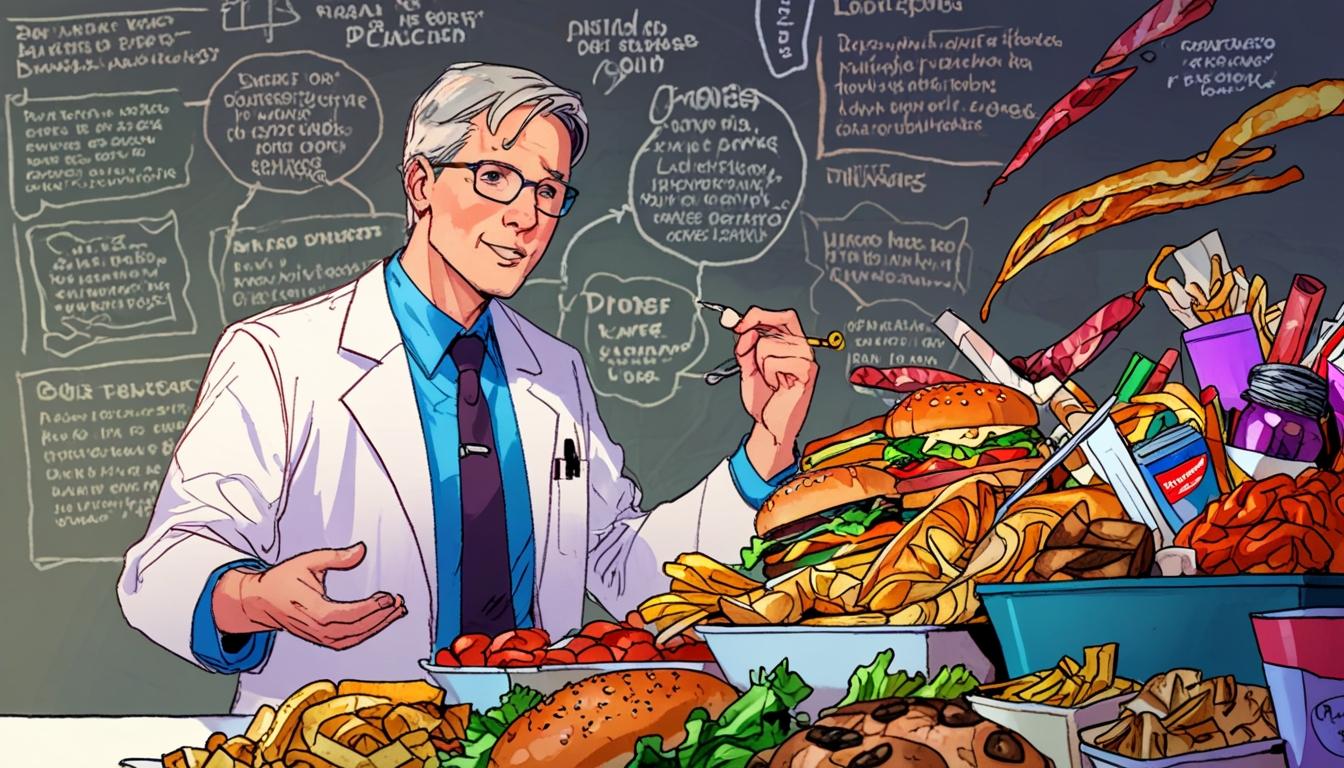In a recent podcast, Dr Chris van Tulleken claims ultra-processed foods may be more harmful than smoking, linking their consumption to serious health and ecological issues.
Dr Chris van Tulleken, a specialist in infectious diseases and a prominent science presenter for the BBC, recently made headlines during an episode of the “Diary of a CEO” podcast, where he discussed the alarming health impacts of ultra-processed foods (UPFs), declaring them potentially more harmful than smoking. This conversation took place with podcast host Steven Bartlett, who has garnered attention for his engaging discussions on various topics.
During the podcast, Dr van Tulleken elaborated on findings from his book “Ultra-Processed People,” asserting that the common confusion surrounding what constitutes harmful foods has contributed significantly to public health issues. He noted, “For a very long time, we have been incredibly confused about what to eat,” referencing the prevalent labels such as ‘junk food’ and ‘processed food’ that fail to encapsulate the health risks associated with certain diets.
In his analysis, Dr van Tulleken pointed out that the consumption of ultra-processed foods has not only overtaken tobacco as a leading cause of early death globally but also results in substantial ecological damage. He stated, “This is particularly true in low income countries and particularly true with low income people living in the UK.” He argued that diets high in UPFs do not merely contribute to individual health crises but also exacerbate larger systematic issues, including loss of biodiversity, carbon emissions, and plastic pollution.
Citing a surge in obesity rates in countries that have transitioned to western diets, he referenced the dramatic changes observed in places like Mexico, Colombia, and Brazil, where obesity became a major public health challenge within a span of just a decade. Dr van Tulleken attributed these shifts primarily to the influx of industrially processed foods that have become characteristic of contemporary diets. He remarked, “The only thing that has changed was the influx of, broadly an American diet of industrial processed foods.”
Dr van Tulleken provided evidence that UPFs can be as addictive as tobacco and alcohol and cautioned against confrontational approaches to dietary change. He argued that “nagging” individuals to refrain from consuming these foods could lead to counterproductive behaviours. Research he mentioned indicates a correlation between high consumption of UPFs and various chronic diseases, suggesting that reducing intake may lead to broad public health benefits.
Several studies corroborate his assessment of the detrimental health effects linked to ultra-processed food. For example, one study concluded that higher UPF consumption is associated with increased risks of cardiovascular disease and overall mortality, highlighting the urgent need for public awareness about dietary choices.
The discourse inspired notable responses from audiences, with one viewer sharing a personal transformation story attributed to Dr van Tulleken’s insights. This individual reported significant weight loss and a successful shift to a diet that largely excludes ultra-processed foods. They reflected on their journey, detailing how simple, wholesome options have replaced their previous eating habits.
The conversation surrounding ultra-processed foods and their impact on both personal health and broader ecological issues continues to rise in importance, as medical professionals and health advocates highlight the need for awareness and understanding regarding the foods consumed in today’s society.
Source: Noah Wire Services
- https://www.youtube.com/watch?v=5QOTBreQaIk – This video features Dr Chris van Tulleken discussing the health impacts of ultra-processed foods, highlighting how they have become a major public health concern, surpassing tobacco in some respects, and contributing to obesity, cardiovascular disease, and environmental issues.
- https://www.menshealth.com/uk/nutrition/a60328727/dr-chris-van-tulleken-ultra-processed-foods – This article provides insights into Dr Chris van Tulleken’s work on ultra-processed foods, explaining their addictive nature and negative health impacts, as well as his strategies for avoiding them. It also touches on the broader societal issues associated with these foods.
- https://www.youtube.com/watch?v=oIej89MIvto – This video further discusses Dr Chris van Tulleken’s research on ultra-processed foods, emphasizing their link to chronic diseases such as diabetes and cardiovascular disease, and exploring how these foods compare to less processed options in terms of health outcomes.
- https://www.federalregister.gov/documents/2024/04/22/2024-07496/guidance-for-federal-financial-assistance – Although this document does not directly address ultra-processed foods, it speaks to broader policy issues that might influence dietary choices and environmental impacts through financial assistance policies in the United States.
- https://waysandmeans.house.gov/wp-content/uploads/2024/08/Report-of-the-Impeachment-Inquiry-of-Joseph-R.-Biden-Jr.-President-of-the-United-States.pdf – This report does not address ultra-processed foods but highlights issues of economic and political influence that could indirectly affect public health policy and food systems.
Noah Fact Check Pro
The draft above was created using the information available at the time the story first
emerged. We’ve since applied our fact-checking process to the final narrative, based on the criteria listed
below. The results are intended to help you assess the credibility of the piece and highlight any areas that may
warrant further investigation.
Freshness check
Score:
8
Notes:
The narrative refers to current discussions and studies on ultra-processed foods, suggesting freshness. However, there are no specific recent dates or events mentioned that would clearly date the content.
Quotes check
Score:
5
Notes:
Dr van Tulleken’s quotes are not verified against earliest known sources, as the article does not provide specific dates or original references for these statements.
Source reliability
Score:
9
Notes:
The narrative originates from a well-known publication, The Mirror, although it cites Dr Chris van Tulleken’s statements from a podcast. Dr van Tulleken is a reputable figure in his field.
Plausability check
Score:
8
Notes:
Claims about ultra-processed foods causing health issues and ecological damage are plausible and supported by recent research trends. However, the narrative’s sweeping assertions about UPFs being worse than smoking globally require more specific evidence.
Overall assessment
Verdict (FAIL, OPEN, PASS): OPEN
Confidence (LOW, MEDIUM, HIGH): MEDIUM
Summary:
While the discussion about ultra-processed foods is relevant and plausible, the narrative lacks specific dates and original sources for quotes. The freshness is decent but could be improved with more current references.













